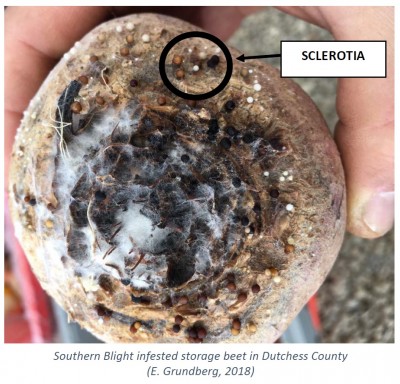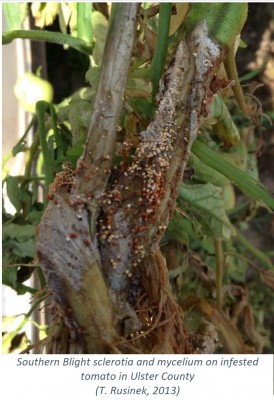Be on the Lookout for Southern Blight
Ethan Grundberg, Vegetable Specialist
Eastern New York Commercial Horticulture
Southern Blight is caused by the fungal pathogen Sclerotium rolfsii and has historically only been a concern to growers in southern states. However, Cornell pathologist Dr. Sarah Pethybridge has seen an
increase in the incidence of Southern Blight in New York over the past several years. This winter, Dr. Pethybridge confirmed the presence of S. rolfsii on golden storage beets in Dutchess County. Given the broad host range of the pathogen that includes over 1,200 crops and weeds, it is imperative that growers who suspect a possible Southern Blight infestation on their farm contact extension to confirm the diagnosis to assist with optimizing crop rotations to reduce soilborne inoculum.
The most common symptom observed in the field is wilting or collapse of the plant. Upon closer inspection, affected plants often have reddish-brown dry lesions at the soil line. Fungal mycelium is also usually present as a thick white mat around the base of the stem. The Southern Blight pathogen also produces overwintering bodies called sclerotia under the right environmental conditions (typically high humidity with temperatures about 80 °F, but sclerotia were found on beets in cold storage at 40 °F). The sclerotia formed by S. rolfsii are a key identifying feature; they are small balls similar in appearance to Dijon mustard seeds that change in color from white to golden to reddish-brown (see image). These sclerotia can survive in the soil for years and endure temperature extremes and drought while waiting to germinate in the presence of a host plant under the right environmental conditions.
Crops that are most commonly affected by Southern Blight are tomatoes, peppers, snap beans, onions, garlic, and Jerusalem artichokes; however, as indicated above, the pathogen can grow and reproduce on a much broader range of plants. Like with most diseases, early detection and proper identification are critical! Infested plants should be removed and destroyed if possible. Symptomatic plants should NOT be placed in compost, as they may contain sclerotia that will then be spread with the compost to other fields. Some small grains and corn are less susceptible to Southern Blight and can be used in rotation in heavily infested fields, but crop rotation is typically not a viable strategy for management of this pathogen given its broad host range. Initial research in New York suggests that deep plowing of infested fields to bury sclerotia and infested residue at least 6-inches deep can lower the pathogen's survival rate.
Several effective chemical controls are available to conventional growers, but they must be applied preventatively. Labeled formulations of azoxystrobin (Quadris), pyraclostrobin (Cabrio), and penthiopyrad (Fontelis) have been effective for growers in the south. Some research has suggested that OMRI-approved biocontrol agents, such as Trichoderma harzianum (RootShield, TerraGrow) and Gliocladium virens (SoilGard), may also help reduce the number of Southern Blight sclerotia and prevent colonization of host plant tissue by the pathogen.



Upcoming Events
2026 Northeast Extension Fruit Consortium Winter Webinar Series
February 4, 2026 : Management of Up and Coming Strawberry Diseases in the Northeastern United States
Session 1: Management of Up and Coming Strawberry Diseases in the Northeastern United States
February 11, 2026 : Kiwiberry Production in the Northeast
Session 2: Kiwiberry Production in the Northeast
February 18, 2026 : Heat Mitigation- Sunburn and Fruit Coloring
Session 3: Heat Mitigation- Sunburn and Fruit Coloring
February 25, 2026 : The Dating Game- Updates in Lepidopteran Mating Disruption
Session 4: The Dating Game- Updates in Lepidopteran Mating Disruption
March 4, 2026 : USEPA Endangered Species Act Strategies and Pesticide Use
Session 5: USEPA Endangered Species Act Strategies and Pesticide Use
March 11, 2026 : Practical Drought Management for Fruit Growers
Session 6: Practical Drought Management for Fruit Growers
Managing the Invasive Swede Midge Webinar
March 6, 2026 : Managing the Invasive Swede Midge Webinar
Swede midge is an invasive fly that causes serious economic losses to brassica crops. Due to its small size and hidden feeding habits, swede midge is often called an "invisible pest" and damage may be misdiagnosed. In this webinar, we will review the swede midge life cycle and crop damage symptoms, current management recommendations, new research findings, and highlights from on-farm case studies with a focus on organic management.
New Farm Manager Skills Day - Get the Tools You Need to Grow Your People (Hudson Valley)
March 10, 2026 : New Farm Manager Skills Day - Get the Tools You Need to Grow Your People
Millbrook, NY
Are you moving into a supervisory farm management role this season and want to get off to a good start? Are you an experienced manager who wants to connect with other "people" managers and work on your skills? This one-day workshop is for you!












































